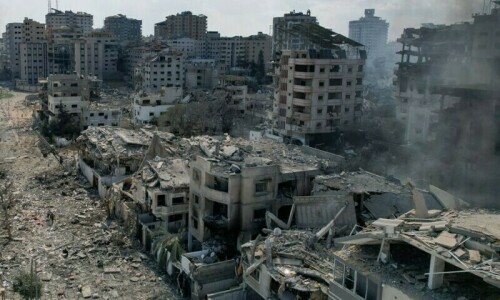KARACHI: The relatives of more than 60 people, who died in the head-on collision between a Shikarpur-bound passenger bus and an oil tanker late on Saturday on the National Highway, desperately looked for some kind of relief by at least being able to see the faces of their loved ones and take their bodies home.
However with all the victims burnt beyond recognition, the relatives looked completely helpless and at a loss outside the mortuary of the Jinnah Postgraduate Medical Centre (JPMC) on Sunday morning.
Also read: Fatal crash between bus, oil tanker leaves 62 dead near Karachi
“The corpses have shrunk to shocking sizes. A six-feet-tall man is two feet long now and these are the ones that are not stuck to one other. Some bodies have fused together due to the fire and all are burnt like charcoal,” said Abdul Qadir Ansari looking for his young friend Saleemullah from Shikarpur.
‘Even the nails on their fingers and toes are gone with everything they wore, including watches and jewellery’
“He was 22 years old and over six feet in height. I know he is among them,” he said gesturing with his eyes at the Edhi mobile mortuary with several bodies. “But I don’t know which one.”
Abdul Qadir said that Saleemullah, who worked at a petrol station in Shikarpur had come down to Karachi for a job interview for the Special Security Unit of the Sindh police and was going back home on the bus that started its journey at about 11pm from Gulshan-i-Hadeed on Saturday.
Salori Bibi was looking for her elder brother, Nazeer Ahmed. “Just show me the bodies. I know in my heart I will be able to recognise my brother even if no one else can,” she asked the Edhi volunteers who were shifting the bodies in the mobile mortuary.
“My brother was here for a short visit from Khairpur. He has a wife and five children back home. He intended getting off the bus at the bypass before it reached Shikarpur. I called on his phone the moment I saw the report about the accident on TV. I tried his phone again and again. Nothing,” she said gulping down her tears.
“Our brother, Mohammad Rahim, was going to Moro. He was wearing a light-blue shalwar kameez,” said one of his six brothers standing there feeling helpless.
“I am also here for my younger brother, Abdul Haq, who was wearing a boski suit and a red cap,” said Syed Abdul Wahab. “He had bought tickets for two seats, numbers 35 and 36, for himself and another relative of ours before boarding the coach at Quaidabad,” he added.
Akal Mohammad, an Edhi Foundation volunteer who said he was the first one to reach the site of the tragedy, said that the bodies were in a terrible condition. “These people looking for their relatives are telling us what kind of clothes they were wearing. What clothes? Even the nails on their fingers and toes are gone with everything they wore, including watches and jewellery,” he said.
“A woman and her two little children, I miraculously found unhurt. They asked if we could drop them at Quaidabad, which we did. Some of the few others who survived broke windows to get out while four others travelling on the bus’s rooftop jumped off to save their lives. This one man told me that due to lack of space inside the cabin, the conductor told him to climb on top of the bus. He said he was feeling very cold and insecure up there and that it was a very uncomfortable ride but he had to be on his way,” the Edhi volunteer said.
Meanwhile, a notice was pasted on the JPMC mortuary gate pillar said that any immediate relative of the victims — father, mother, son, daughter, brother or sister — should provide a blood sample to the hospital for a DNA matching with the bodies.
“But I am a paternal uncle. Would my sample do?” Junaid Ahmed, looking for his 16-year-old nephew Waseem and 60-year-old cousin Mir Hassan, said. “I remember when Waseem had once injured himself quite badly as a little boy, I had even donated blood to save his life. He must carry my DNA, too, won’t he?”
Published in Dawn, January 12th, 2015
On a mobile phone? Get the Dawn Mobile App: Apple Store | Google Play














































Dear visitor, the comments section is undergoing an overhaul and will return soon.